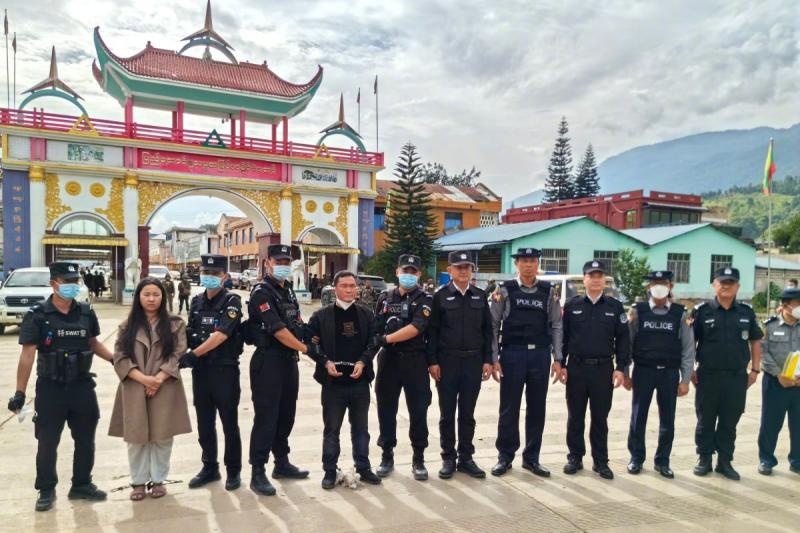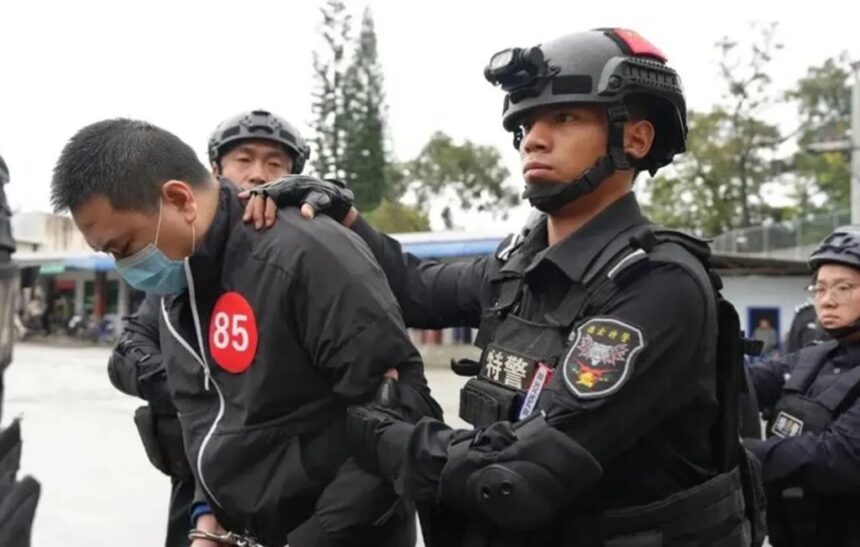Authorities in Zhejiang, China, have charged 16 Myanmar citizens with crimes, including murder and telecom fraud, as part of a crackdown on cross-border cybercrime in the Golden Triangle that spans parts of Myanmar, Thailand, and Laos.
Criminal cyber gangs are accused of enticing hundreds of thousands of individuals across the border into Myanmar and then forcing them to participate in telecom frauds in the Golden Triangle.
Myanmar police have handed over more than 31,000 telecom fraud suspects to China since law enforcement personnel from both nations began targeting gangs in the Golden Triangle in September. The crime syndicates generated millions of dollars daily from the schemes.
Last year, Chinese official broadcaster CCTV stated that authorities suspected up to 100,000 people were involved in telecom fraud in just one area – Myawaddy, on the border between Myanmar and Thailand’s Mae Sot district in Tak province.
The new allegations, filed in the eastern province of Zhejiang, involve 39 people, 16 of whom are Myanmar citizens. Murder, fraud, wrongful imprisonment, organized gambling and prostitution, and drug trafficking are among the charges against them.

Ming Family Takedown
Members of the Ming family, an ethnically Chinese family, are among the people accused of leading a cross-border crime conspiracy. Ming Xuechang, the family’s chief, died in an apparent suicide after being jailed last November.
His son, Ming Guoping (also known as Mg Myin Shaut Phyin), daughter, Ming Julan (Myin Shut Lan), and granddaughter, Ming Zhenzhen (Ma Thiri Maung), all believed to be Myanmar citizens, were handed up to Chinese officials in November of last year.
Ming Guoping, 43, was the Kokang Border Guard Force commander, part of Myanmar’s military.
According to Xinhua, the 39 suspects are either part of the Ming family syndicate or its related groups, and they are based in Kokang, a region in Shan state bordering China’s province of Yunnan.
The suspects are either Chinese citizens or ethnically Chinese Myanmar citizens accused of targeting victims who speak Chinese.
“They have relied on armed forces to carry out large-scale telecom and online fraud targeting Chinese citizens, among other crimes,” according to the report.
The news agency’s commentary stated that the charges will “serve as a strong deterrent to overseas telecom fraud criminals, demonstrating [China’s] strength and spirit of the rule of law.”
Prosecutors told Xinhua that Chinese authorities have jurisdiction over the case since acts committed outside China violated Chinese nationals’ rights. It also claimed that some of the crimes had occurred within China, such as sex trafficking and the organization of gambling businesses.
According to Xinhua, Chinese and Myanmar police cooperated to investigate the case and hand over suspects.
This is not the first time China’s judicial authorities have targeted transnational crime. In one of the most notable cases, Golden Triangle drug boss Naw Kham and three companions were killed in 2013 for the murder of 13 Chinese Nationals on the Mekong River between Thailand and Laos.
Related News:
Foreign Tourist Flock to China’s Ice City in Heilongjiang Province

Geoff Thomas is an award winning journalist known for his sharp insights and no-nonsense reporting style. Over the years he has worked for Reuters and the Canadian Press covering everything from political scandals to human interest stories. He brings a clear and direct approach to his work.














